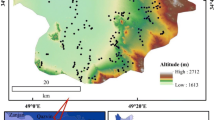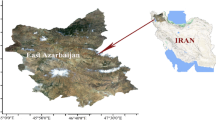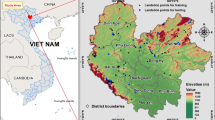Abstract
The investigation of 16 fuzzy algorithms implemented in data mining system KEEL from the point of view of their usefulness to create bagging ensemble models to assist with real estate appraisal were presented in the paper. All the experiments were conducted with a real-world dataset derived from a cadastral system and registry of real estate transactions. The results showed there were significant differences in accuracy between individual algorithms. The analysis of measures of error diversity revealed that only the highest values of an average pairwise correlation of outputs were a profitable criterion for the selection of ensemble members.
Access this chapter
Tax calculation will be finalised at checkout
Purchases are for personal use only
Preview
Unable to display preview. Download preview PDF.
Similar content being viewed by others
References
Aksela, M., Laaksonen, J.: Using diversity of errors for selecting members of a committee classifier. Pattern Recognition 39, 608–623 (2006)
Alcalá-Fdez, J., et al.: KEEL: A Software Tool to Assess Evolutionary Algorithms for Data Mining Problems. Soft Computing 13(3), 307–318 (2009)
Banfield, R.E., et al.: A Comparison of Decision Tree Ensemble Creation Techniques. IEEE Trans. on Pattern Analysis and Machine Intelligence 29(1), 173–180 (2007)
Breiman, L.: Bagging Predictors. Machine Learning 24(2), 123–140 (1996)
Brown, G., Wyatt, J., Harris, R., Yao, X.: Diversity Creation Methods: A Survey and Categorisation. Journal of Information Fusion 6(1), 5–20 (2005)
Canul-Reich, J., Shoemaker, L., Hall, L.O.: Ensembles of Fuzzy Classifiers. In: Proc. IEEE International Conference on Fuzzy Systems, FUZZ-IEEE 2007, pp. 1–6 (2007)
Chandra, A., Yao, X.: Evolving hybrid ensembles of learning machines for better generalisation. Neurocomputing 69, 686–700 (2006)
Chawla, N.V., Hall, L.O., Bowyer, K.W., Kegelmeyer, W.P.: Learning Ensembles From Bites: A Scalable and Accurate Approach. Journal of Machine Learning Research 5, 421–451 (2004)
Chen, T., Ren, J.: Bagging for Gaussian Process Regression. Neurocomputing 72(7-9), 1605–1610 (2009)
Cordón, O., Quirin, A.: Comparing Two Genetic Overproduce-and-choose Strategies for Fuzzy Rule-based Multiclassification Systems Generated by Bagging and Mutual Information-based Feature Selection. Int. J. Hybrid Intelligent Systems (2009) (in press)
Demšar, J.: Statistical comparisons of classifiers over multiple data sets. Journal of Machine Learning Research 7, 1–30 (2006)
Dos Santos, E.M., Sabourin, R., Maupin, P.: A dynamic overproduce-and-choose strategy for the selection of classifier ensembles. Pattern Recognition 41(10), 2993–3009 (2008)
Freund, Y., Schapire, R.E.: Decision-theoretic generalization of on-line learning and an application to boosting. J. Computer and System Sciences 55(1), 119–139 (1997)
García-Pedrajas, N.: Constructing Ensembles of Classifiers by Means of Weighted Instance Selection. IEEE Transactions on Neural Networks 20(2), 258–277 (2009)
Hernandez-Lobato, D., Martinez-Munoz, G., Suarez, A.: Pruning in ordered regression bagging ensembles. In: Yen, G.G. (ed.) Proceedings of the IEEE World Congress on Computational Intelligence, pp. 1266–1273 (2006)
Islam, M.M., et al.: Bagging and Boosting Negatively Correlated Neural Networks. IEEE Trans. on Systems, Man, and Cybernetics, Part B: Cyb. 38(3), 771–784 (2008)
Jacobs, R.A., Jordan, M.I., Nowlan, S.J., Hinton, G.E.: Adaptive mixtures of local experts. Neural Computation 3, 79–87 (1991)
Kim, D.: Improving the Fuzzy System Performance by Fuzzy System Ensemble. Fuzzy Sets and Systems 98(1), 43–56 (1998)
Król, D., Lasota, T., Trawiński, B., Trawiński, K.: Investigation of Evolutionary Optimization Methods of TSK Fuzzy Model for Real Estate Appraisal. International Journal of Hybrid Intelligent Systems 5(3), 111–128 (2008)
Krzystanek, M., Lasota, T., Trawiński, B.: Comparative Analysis of Evolutionary Fuzzy Models for Premises Valuation Using KEEL. In: Nguyen, N.T., Kowalczyk, R., Chen, S.-M. (eds.) ICCCI 2009. LNCS, vol. 5796, pp. 838–849. Springer, Heidelberg (2009)
Kuncheva, L.I., Whitaker, C.J.: Measures of Diversity in Classifier Ensembles and Their Relationship with the Ensemble Accuracy. Machine Learning 51, 181–207 (2003)
Lasota, T., Mazurkiewicz, J., Trawiński, B., Trawiński, K.: Comparison of Data Driven Models for the Validation of Residential Premises Using KEEL. International Journal of Hybrid Intelligent Systems (2009) (in press)
Lasota, T., Telec, Z., Trawiński, B., Trawiński, K.: A Multi-agent System to Assist with Real Estate Appraisals using Bagging Ensembles. In: Nguyen, N.T., Kowalczyk, R., Chen, S.-M. (eds.) ICCCI 2009. LNCS, vol. 5796, pp. 813–824. Springer, Heidelberg (2009)
Lasota, T., Telec, Z., Trawiński, B., Trawiński, K.: Exploration of Bagging Ensembles Comprising Genetic Fuzzy Models to Assist with Real Estate Appraisals. In: Corchado, E., Yin, H. (eds.) IDEAL 2009. LNCS, vol. 5788, pp. 554–561. Springer, Heidelberg (2009)
Liu, Y., Yao, X.: Ensemble learning via negative correlation. Neural Networks 12(10), 1399–1404 (1999)
Margineantu, D.D., Dietterich, T.G.: Pruning Adaptive Boosting. In: Proc. 14th Int. Conf. Machine Learning, pp. 211–218 (1997)
Polikar, R.: Ensemble Learning. Scholarpedia 4(1), 2776 (2009)
Rokach, L.: Taxonomy for characterizing ensemble methods in classification tasks: A review and annotated bibliography. Comp. Stat. and Data Analysis 53, 4046–4072 (2009)
Schapire, R.E.: The Strength of Weak Learnability. Machine Learning 5(2), 197–227 (1990)
Wolpert, D.H.: Stacked Generalization. Neural Networks 5(2), 241–259 (1992)
Zhou, Z.H., Wu, J., Tang, W.: Ensembling Neural Networks: Many Could Be Better Than All. Artificial Intelligence 137, 239–263 (2002)
Author information
Authors and Affiliations
Editor information
Editors and Affiliations
Rights and permissions
Copyright information
© 2010 Springer-Verlag Berlin Heidelberg
About this paper
Cite this paper
Krzystanek, M., Lasota, T., Telec, Z., Trawiński, B. (2010). Analysis of Bagging Ensembles of Fuzzy Models for Premises Valuation. In: Nguyen, N.T., Le, M.T., Świątek, J. (eds) Intelligent Information and Database Systems. ACIIDS 2010. Lecture Notes in Computer Science(), vol 5991. Springer, Berlin, Heidelberg. https://doi.org/10.1007/978-3-642-12101-2_34
Download citation
DOI: https://doi.org/10.1007/978-3-642-12101-2_34
Publisher Name: Springer, Berlin, Heidelberg
Print ISBN: 978-3-642-12100-5
Online ISBN: 978-3-642-12101-2
eBook Packages: Computer ScienceComputer Science (R0)




